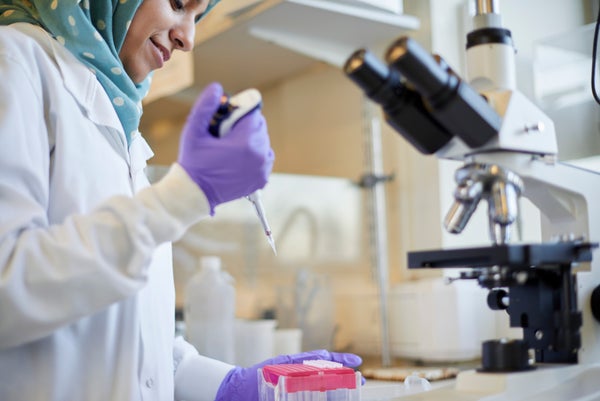本文發表於《大眾科學》的前部落格網路,反映了作者的觀點,不一定代表《大眾科學》的觀點
科學正受到威脅,世界各地的人們正在動員起來保衛科學。但是,如果我們想支援科學,我們也必須支援使其偉大的東西——多樣性。我們一些最重大的發現,如希格斯玻色子和人類基因組序列,之所以能夠實現,是因為許多來自不同背景的科學家的集體工作。 多樣化的想法對於科學以及解決世界上最緊迫的問題至關重要。然而,為了促進多樣性,我們必須面對科學和社會中普遍存在的結構性不平等和歧視。
我們今天——國際婦女節——以及每天都關注科學領域的女性,因為女性是科學領域中最大的代表性不足群體。女性約佔世界人口的一半,但只有28% 的研究人員。制度化的歧視形式,如同工不同酬、不充分的產假政策、不靈活的工作時間表、性別規範和工作場所騷擾,往往阻止女性進入 和留在科學事業中。這些障礙意味著我們永遠不僅僅是科學家;作為女性,我們必須應對從家庭到工作場所的性別歧視制度和歧視。
我們作為科學界的女性團結一致,但我們永遠不僅僅是女性。我們的性別只是我們社會身份和社會地位的一個方面。所有人都具有基於其種族、民族、國籍、殘疾狀況、性別、宗教、性取向、移民身份和社會經濟背景的多種交叉身份。金伯莉·克倫肖 (Kimberle Crenshaw) (1989) 的 交叉性理論 幫助我們理解,這些社會構建的但重要的類別會影響我們生活的方方面面——從我們住在哪裡到我們從事什麼工作。如果我們只關注科學領域的性別問題,而不明確解決所有形式的特權和不平等,我們就無法消除將不同女性群體趕出科學領域的制度障礙和偏見。
關於支援科學新聞
如果您喜歡這篇文章,請考慮透過以下方式支援我們屢獲殊榮的新聞報道 訂閱。 透過購買訂閱,您將有助於確保關於當今塑造我們世界的發現和想法的有影響力的故事的未來。
科學領域中的性別和種族差距表明,需要在各個層面加強包容性。雖然白人男性和女性各佔美國人口的約 30%,但白人男性在科學和工程領域佔據 49% 的職位,而白人女性僅佔 18%。比例對於黑人和西班牙裔女性也很低,她們分別占人口的 7% 和 8%,但在科學和工程領域僅佔 2% 的職位。
不僅數字令人擔憂。研究表明,女性在 STEM 領域面臨的偏見和障礙從小學開始,一直持續到高階職位。早期,女孩們被老師和同齡人勸阻不要追求科學,因此,她們經常選擇退出 STEM 研究。 公開的和無意識的性別偏見繼續影響著大學科學課程中的女性,在這些課程中,女學生被認為比男學生知識較少。男性教師傾向於比女性同事培訓和僱用更少的女性研究生和博士後研究人員。 與白人男性相比,女性和代表性不足的少數族裔在各個學科中不太可能獲得指導。女性的發表也較少,可能是由於“馬蒂爾達效應”,其中男性撰寫的摘要被認為比女性撰寫的摘要具有更高的科學質量。女性也較少被引用,這是學術界衡量價值的標準。
在課堂上,有色人種女性的權威性受到挑戰,能力受到質疑,學術專長被詆譭。最近的研究強調,與其它職業領域相比,在 STEM 環境中,對被認定為女同性戀、雙性戀或變性人的女性的偏見尤其強烈。因此,女性科學家同時面臨著工作場所中來自兩個性別的性別歧視、種族主義和恐同症等多種形式的歧視。科學不能簡單地試圖僱用更多女性,而不解決所有偏見來解決其多樣性問題。
我們描述的問題並不新鮮。幾個世紀以來,女性一直在為在科學領域獲得認可而努力。她們的許多科學貢獻仍然不被承認和低估。排除和抹殺女性的科學成就剝奪了有抱負的科學家獲得女性榜樣的機會,並使關於科學家外貌的性別歧視刻板印象長期存在。承認女性在科學領域中鮮為人知的作用,對於揭示科學事業敘事中持續存在的種族主義和性別歧視也是必要的。
例如,被認為是現代婦產科之父的詹姆斯·馬里昂·西姆斯博士,對未麻醉的被奴役婦女進行實驗,開發出一種至今仍用於治療女性的手術。西姆斯博士研究中的女性在很大程度上被從歷史記錄中抹去。當我們慶祝他的成就而未能承認使這項科學創新成為可能的剝削、暴力和系統性不平等時,我們就是粉飾歷史的幫兇。現實情況是,科學界充滿了性別歧視和種族主義,只要我們不承認和解決這些問題,它就永遠不會擁有最優秀、最聰明的科學家。
為社會正義而戰並非超出科學家的職責範圍,也不是我們可以在科學不再受到威脅時才放在一旁的事情。捍衛少數群體的權利和消除一切形式的歧視對我們的工作至關重要。倡導科學需要我們倡導女性。倡導女性意味著倡導性別和種族正義。這意味著推進移民、殘疾人和 LGBTQIA 的權利、宗教自由,並挑戰一切形式的歧視和不平等。
我們需要促進一個多元化和包容性的科學界,將先進的科學解決方案應用於當地和全球挑戰。我們需要致力於科學領域的公平,並繼續創造一個女性可以在科學研究和職業生涯中蓬勃發展的環境。我們需要為女性科學家組織起來、領導、無所畏懼地分享、建立支援、學習應對我們獨特挑戰的工具、尋求和提供指導,以及推動科學事業發展提供一個積極的空間。我們需要一個平臺來宣傳女性的科學成就和故事,這樣我們就不會再是“隱藏人物”。這就是為什麼今天女性科學家的組織仍然是必要的。
我們不僅僅是科學家;我們是致力於促進社會正義的多元化女性和活動家。
